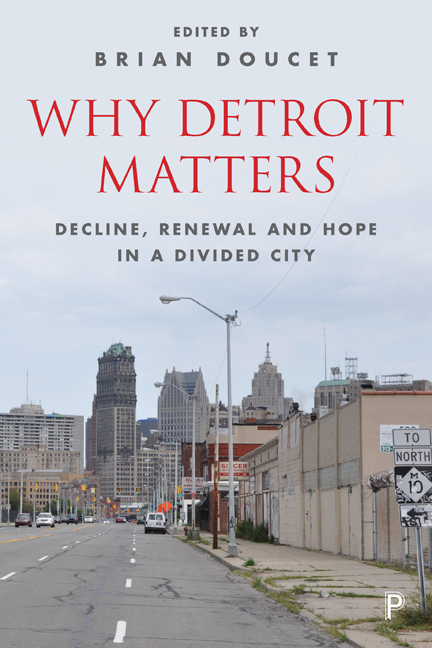Book contents
- Frontmatter
- Contents
- List of contributors
- List of figures and tables
- Acknowledgments
- one Introduction: why Detroit matters
- Section One Lessons from Detroit
- Intermezzo I You may not know my Detroit
- Section Two Practices from Detroit
- Intermezzo II My Detroit
- Section Three Conversations from Detroit
- References
- Index
eight - This is (not) Detroit: projecting the future of Germany’s Ruhr region
Published online by Cambridge University Press: 05 April 2022
- Frontmatter
- Contents
- List of contributors
- List of figures and tables
- Acknowledgments
- one Introduction: why Detroit matters
- Section One Lessons from Detroit
- Intermezzo I You may not know my Detroit
- Section Two Practices from Detroit
- Intermezzo II My Detroit
- Section Three Conversations from Detroit
- References
- Index
Summary
As was discussed in Chapter One of this book, Detroit has become a metonym for urban failure, and many places around the world use “Detroit” as a warning to further a particular message or agenda. The city is talked about, but rarely actively engaged with. In this chapter, Julia Sattler examines the ways in which Detroit is used and interpreted in Germany's Ruhr Region. She starts by deconstructing the popular idea presented in the German media that a Detroit-style bankruptcy is possible in poorer municipalities within the Ruhr. The chapter then examines the similarities and differences between these two areas, particularly in their economic trajectories and current state of deindustrialization and political fragmentation. Sattler focuses on the different trajectories that have been taken, specifically examining how each place deals with the legacy of industrial decline. The Ruhr has been an innovator in using its industrial heritage as a tool for economic growth; Sattler critically examines major events such as the 2010 European Capital of Culture which was held in the Ruhr.
Empirically, the chapter focuses on two specific projects that make direct reference to Detroit. The first is Learning from Detroit, a manifesto focusing on the “right to the city” in a deindustrializing context. The second is the Das Detroit Projekt, a publicly financed art project that emerged in response to the closure of General Motors’ Opel factory in Bochum, a city in the eastern part of the Ruhr Region. It paints a decidedly negative picture of Detroit. With its slogan “This is not Detroit,” it focuses quite literally on not learning from the city.
Sattler argues that both projects provide only superficial references and no real engagement with Detroit. She is highly critical of the ways in which Das Detroit Projekt deliberately accentuates the differences so that Detroit is, in her words, portrayed as the “absolutely horrific version of what could happen in Bochum,” and that the Ruhr's strategies for reinvention (including high-end flagships and cultural events) are painted in a much more positive light by comparison. This is an important example of the actual practices of using Detroit as a warning, which, in this case, also serves to justify and legitimize major redevelopment projects and top-down cultural initiatives.
- Type
- Chapter
- Information
- Why Detroit MattersDecline, Renewal and Hope in a Divided City, pp. 157 - 176Publisher: Bristol University PressPrint publication year: 2017



